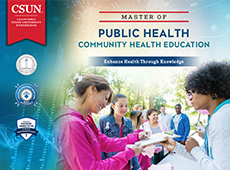- yr program
HSCI 693A Supervised Field Training
Public health practice - applying the knowledge, theory, and skills learned throughout the MPH program - is an integral part of the MPH degree. Learners will work with selected agencies or organizations to gain practical experience in public health practice. The internship provides early experience for the newer public health professional. For those who have extensive experience in their respective fields, the internship experience provides an opportunity to further develop their skills as a public health practitioner and how their role contributes to a broader public health context.
The field experience is 300 hours and is required. The field experience must be accomplished during two consecutive terms.
Field experience placements will most likely be secured by the student due to geographic variations. However, the internship supervisor will work with each student to ensure the student has a meaningful experience. The internship supervisor will correspond directly with the onsite internship preceptor for initial and exit interviews.
Our MPH alumni have worked in a variety of settings including local, state, national, and international public health agencies, health-based nonprofits, community-based organizations, and in health care, academic/research, and worksite wellness environments.
A learner may work at their current place of employment for their field placement, but their internship project must be distinctly different than their normal employment duties and not be completed during scheduled work hours. Supervision of the intern must be provided by someone on site (a preceptor) who has an MPH or DPH degree. This helps ensure the student is completing the competencies required (listed below) of the supervised field training experience. An example of a project may include conducting an evaluation or research project by an organization, agency, or clinic or conducting a health and wellness symposium at your place of employment.
Some of the required hours can also be accomplished by completing professional development opportunities such as attending or presenting at a local, state, and/or national conference, becoming CHES/MCHES/CPH certified, completing various online certifications (examples may be the Office of Minority Health’s Cultural Competency Certificate, the National Institutes of Health ethical research training, etc.).
Note – all internship opportunities must have preapproval from internship instructor and MPH Online Program Director.
NCHEC Seven Areas of Responsibility Addressed in the MPH Internship:
- Area I: Assess Needs, Assets and Capacity for Health Education
- Area II: Plan Health Education
- Area III: Implement Health Education
- Area IV: Conduct Evaluation and Research Related to Health Education
- Area V: Administer and Manage Health Education
- Area VI: Serve as a Health Education Resource Person
- Area VII: Communicate and Advocate for Health and Health Education


